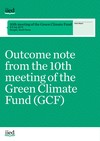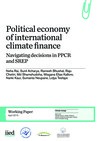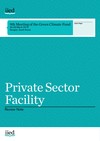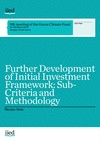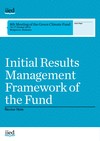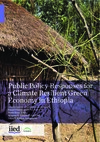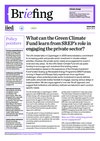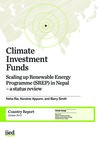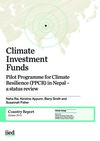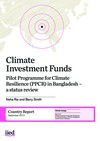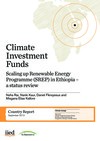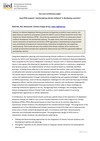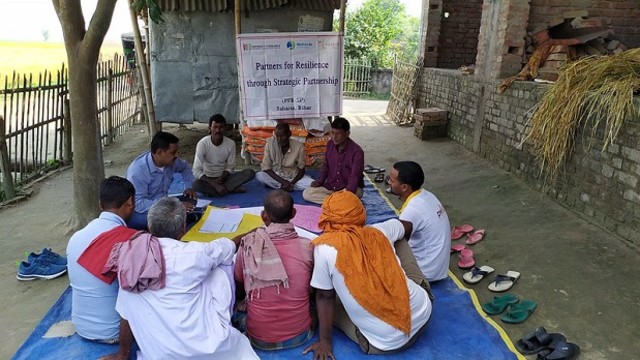Understanding the political economy of the Climate Investment Funds
IIED is examining the ideas, resources and power dynamics that shape how the Climate Investment Funds achieve development impacts. Together, these factors make up the political economy, and examining them will help governments and development organisations understand how the climate investment funds can best bring about the transformational change the funds aim for.
Neha Rai was a senior researcher (climate finance), in IIED's Climate Change research group until January 2021.

The Climate Investment Funds are intended to help developing countries pilot low-emission and climate-resilient development. They are led by multi-lateral development banks, and have a 'sunset clause', setting an end date once countries have an effective 'architecture' – including policy, institutional, and financial systems – for responding to climate change.
The UK's Department for International Development (DFID) has asked IIED to analyse the political economy surrounding the first round of the funds, and whether it helps or hinders effective and climate-resilient development.
The project runs from 2012–2015. It will examine how well the Scaling Up Renewable Energy program is helping Nepal and Ethiopia shift to a low green-house gas development pathway, and how effective the pilot program for climate resilience is at helping Nepal and Bangladesh transform to a resilient, sustainable and poverty-cutting development path.
In particular, we will look at:
How the countries are conceptualising, negotiating and implementing these programmes; and
What ideas, powers and resources drive development through these investments.
The evaluation will give national governments the evidence they need to better plan their investments and strategies in response to climate change. And it will recommend how the Climate Investment Funds can be better governed and managed to maximise their outcomes for development.
Country reports
As the CIF unfolds, lessons can be gathered from the early stages of the programme. IIED is undertaking case studies of selected countries participating in two Strategic Climate Fund (SCF) programmes: the pilot programme for climate resilience (PPCR) and the Scaling up Renewable Energy programme (SREP). These country reports look at the status of PPCR in Bangladesh and of SREP in Ethiopia respectively.
These initial reflections point to areas where further in-depth political economy analysis will be needed to understand how planning and implementation decisions are made and be able to attribute the real cause behind observed trends.
Climate Investment Funds: Scaling up Renewable Energy Programme (SREP) in Nepal – a status review
Climate Investment Funds: Scaling up Renewable Energy Programme (SREP) in Ethiopia – a status review
Climate Investment Funds: Pilot Programme for Climate Resilience (PPCR) in Nepal – a status review
Briefing papers
Deepening readiness for climate finance: the role of the political economy
As the UN prepares to roll out a multibillion-dollar Green Climate Fund, other climate finance initiatives are already reshaping the political landscape in developing countries. New incentives and governance structures have reshuffled priorities and power. Decision-makers need to understand these forces in order to deliver plans that all stakeholders will support. Clarity about the actors, ideas and interests that drive decisions – the political economy of climate investments – can help leaders build consensus, avoid obstacles and pick more equitable investments supported by broader constituencies.
What can the Green Climate Fund learn from SREP's role in engaging the private sector?
The UN climate talks in Copenhagen in 2009 demonstrated a commitment to increasing public and private sector investment in climate-related activities. However, the private sector needs encouragement to invest in novel and risky areas. As the UN's Green Climate Fund will use public funding to encourage such investment this briefing makes recommendations based on the experience of the CIF-funded SREP already running in Nepal and Ethiopia. Early experiences show significant challenges: where potential private sector involvement is poorly defined, both public and private bodies hesitate to engage, causing serious delays in implementation. We also argue against a 'one-size-fits-all' approach, and suggest that institutions and delivery methods are tailored to each country’s specific needs.
Climate Investment Funds: understanding the PPCR in Bangladesh and Nepal
The Pilot Programme for Climate Resilience (PPCR) now operates in nine countries and two regions. It aims to support these countries and regions to prepare and implement climate resilience programmes that are long term and integrated into wider poverty reduction and development planning. Sharing early insights gained from the experiences of two pilot countries – Bangladesh and Nepal – can help to inform the ongoing PPCR implementation process and offers early guidance on issues that may arise in delivering transformative programmes.
PPCR contributory paper
How PPCR supports 'mainstreaming climate resilience' in developing countries
As National Adaptation Planning processes are beginning to unfold in many countries, this paper draws on experiences of programs outside the UNFCCC such as Climate Investment Fund’s Pilot Program for Climate Resilience (PPCR). One of the key components of PPCR is to mainstream climate resilience development into development planning. The paper shares some early lessons from a cross-country assessment of experiences and trends in PPCR approaches in implementing its programmatic cycle, prioritisation of programs for mainstreaming, institutional strengthening, and supporting mainstreaming.
Working paper
Political economy of international climate finance: Navigating decisions in PPCR and SREP
This working paper explores how countries can enhance their 'climate finance readiness' by understanding their internal political economy. Studies in three countries reveal how actors' various ideas and incentives influence their choices and decisions on climate finance projects. Understanding how these factors interact – understanding the political economy – can help policymakers manage expectations and stakeholder risks early on, prioritise equitable climate finance investments and fashion a consensus from divergent ideas.

